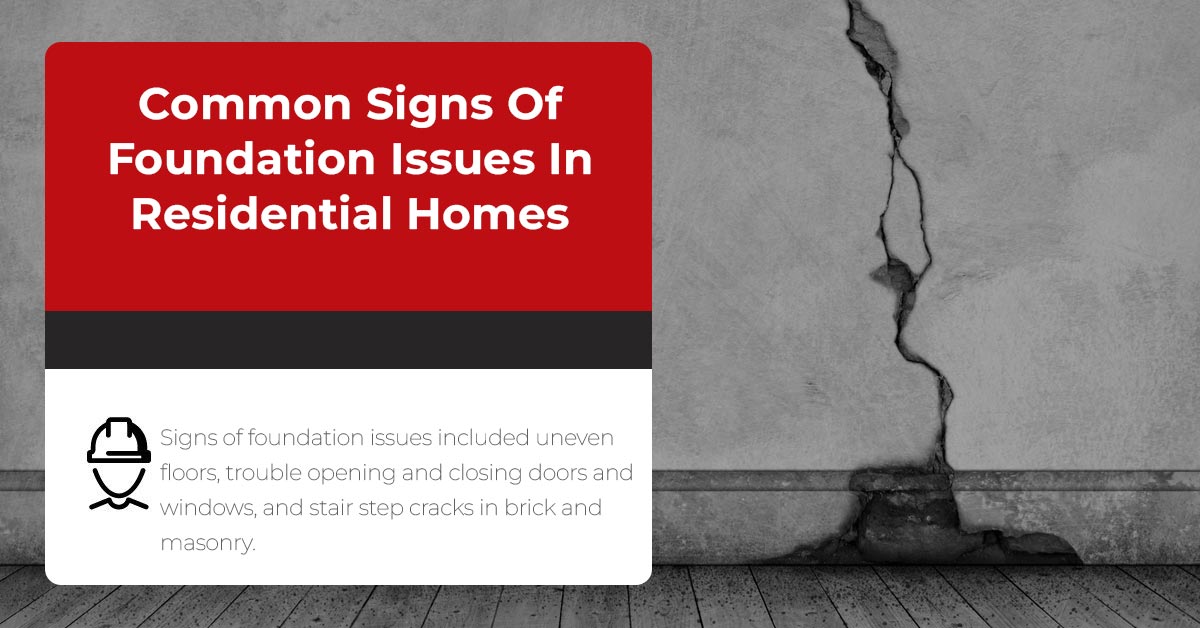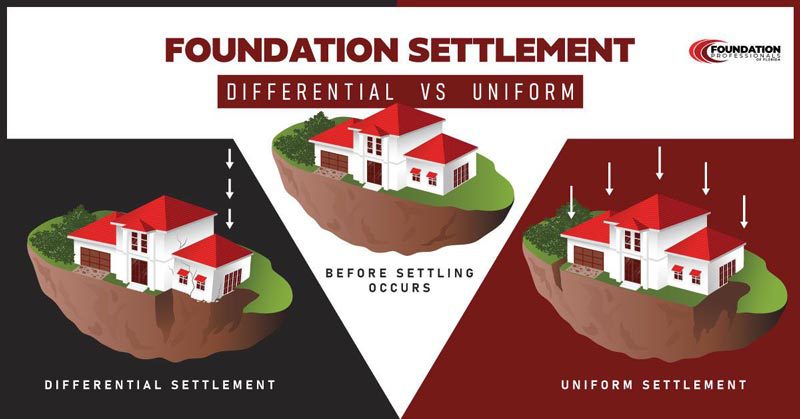Looking for information on the most common signs of foundation issues in residential homes? If so, don’t hit that back button because you’ve landed on the right page. In this article, we’ll review the most common signs of foundation issues, the most common foundation problems, how they’re repaired, and how you can help prevent foundation trouble.
Common Signs Of Foundation Issues In Residential Homes
Foundation problems are often difficult to detect, especially in the early stages. However, a failing foundation can lead to more extensive and costly repairs if not addressed promptly. Here are some of the most common signs that a home has a foundation problem:
- Cracks in the walls, ceilings, and floors – If you notice cracks in the walls, particularly around door and window frames, this may indicate foundation issues. These cracks can be vertical, horizontal, or diagonal and may appear on interior and exterior walls.
- Uneven floors – A foundation problem can cause floors to slope or become uneven, creating a trip hazard. If your floor is uneven or feels like it’s sagging in certain areas, this could indicate foundation failure.
- Doors and windows that won’t open or close – Bowing or sagging walls caused by foundation issues can cause doors and windows to become misaligned, making them difficult to open or close. If you notice that your doors or windows are sticking, this could indicate foundation problems.
- Gaps around doors and windows – Another indication of foundation issues is gaps between doors and windows and their frames. Over time, shifting foundations can cause these gaps to become larger, allowing air and moisture to seep in.
- Stair step cracks in brick or masonry – These are a sure sign of foundation trouble and should be evaluated immediately by a foundation repair contractor.
If you notice any of these signs – or anything else that seems suspicious – it’s essential to have your foundation inspected by a professional. Ignoring the problem will only lead to more extensive and costly repairs. Addressing foundation problems early can ultimately save you time and money and ensure your home’s safety and stability.
The Two Most Common Causes Of Foundation Problems
Foundation issues are a common occurrence in residential homes. The two most common foundation problems are differential settlement and hydrostatic pressure.
Differential foundation settlement
Differential settlement happens when a foundation settles unevenly into the soil. This places considerable stress on the foundation and can lead to severe structural damage.
The causes of differential foundation settlement include the following:
- Expansive soil – Soil that contains a lot of clay swells when it soaks up moisture and then shrinks when it releases moisture and dries out. This swelling and shrinking creates movement in the ground under the foundation and can, over time, lead to differential settlement.
- Erosion-prone soil – If the soil under a home is prone to erosion, it can wash away and leave voids behind. If the house settles into these voids, there will be differential settlement.
- Inadequate soil preparation – Before construction starts, the soil needs to be tamped down. If this isn’t done, the structure will settle into the ground after it’s built, usually unevenly.
- Excavation next door – If your neighbor digs a big hole too close to your home, it could destabilize the foundation causing differential settlement.
- Natural disasters – Earthquakes, floods, hurricanes, etc., can all cause differential settlement.
Hydrostatic pressure
If you have a crawl space or basement foundation, poor drainage around the foundation can cause hydrostatic pressure to build up and exert pressure against the foundation walls. Eventually, the walls will start to bow inward and even crack if the pressure isn’t relieved.
It’s vital to address these issues promptly, as foundation problems can negatively impact the home’s structural integrity. Homeowners should contact a licensed foundation repair contractor to assess any suspected foundation issues and provide the necessary repairs. In most cases, it’s possible to fix the foundation issues without causing significant disruption to the home and its occupants. Being proactive about foundation maintenance and repair can save homeowners considerable money in the long run.
How Are Foundations Repaired?
The chosen repair solution depends on the specific foundation issue. If the problem is differential settlement, the repair solution will probably be underpinning using either push or helical piers. Underpinning extends your home’s foundation down to soil that can support it. For more information, see What Is Underpinning (Understanding Foundation Problems).
If the problem is a cracked and bowed foundation wall caused by hydrostatic pressure, the repair solution might be carbon fiber straps to support the wall and a drain tile system around the foundation to prevent the problem from happening again. For more information, see How Can Carbon Fiber Repair Foundations?
How Homeowners Can Help Prevent Foundation Issues
Since water is a common reason for foundation problems, you can go a long way toward preventing issues by simply getting groundwater under control around your foundation. Here are some ways to do that:
- Make sure the yard around your home slopes away from the foundation. This will prevent groundwater from draining toward the foundation.
- Use downspout extensions to carry runoff at least 15 feet from your home’s foundation before release. Downspout extensions are inexpensive and easy to install.
- Consider relocating any flowers or shrubs planted next to your house. They may look beautiful, but they need water.
- Clean your gutters regularly to ensure water doesn’t spill over the side of your home and soak into the ground around the foundation.
- Install a drain tile system to prevent excess moisture from building up in the soil around the foundation.
If you think your home might have a foundation issue, contact Foundation Professionals of Florida today and schedule an evaluation. If we find a problem, we’ll give you a repair estimate.





